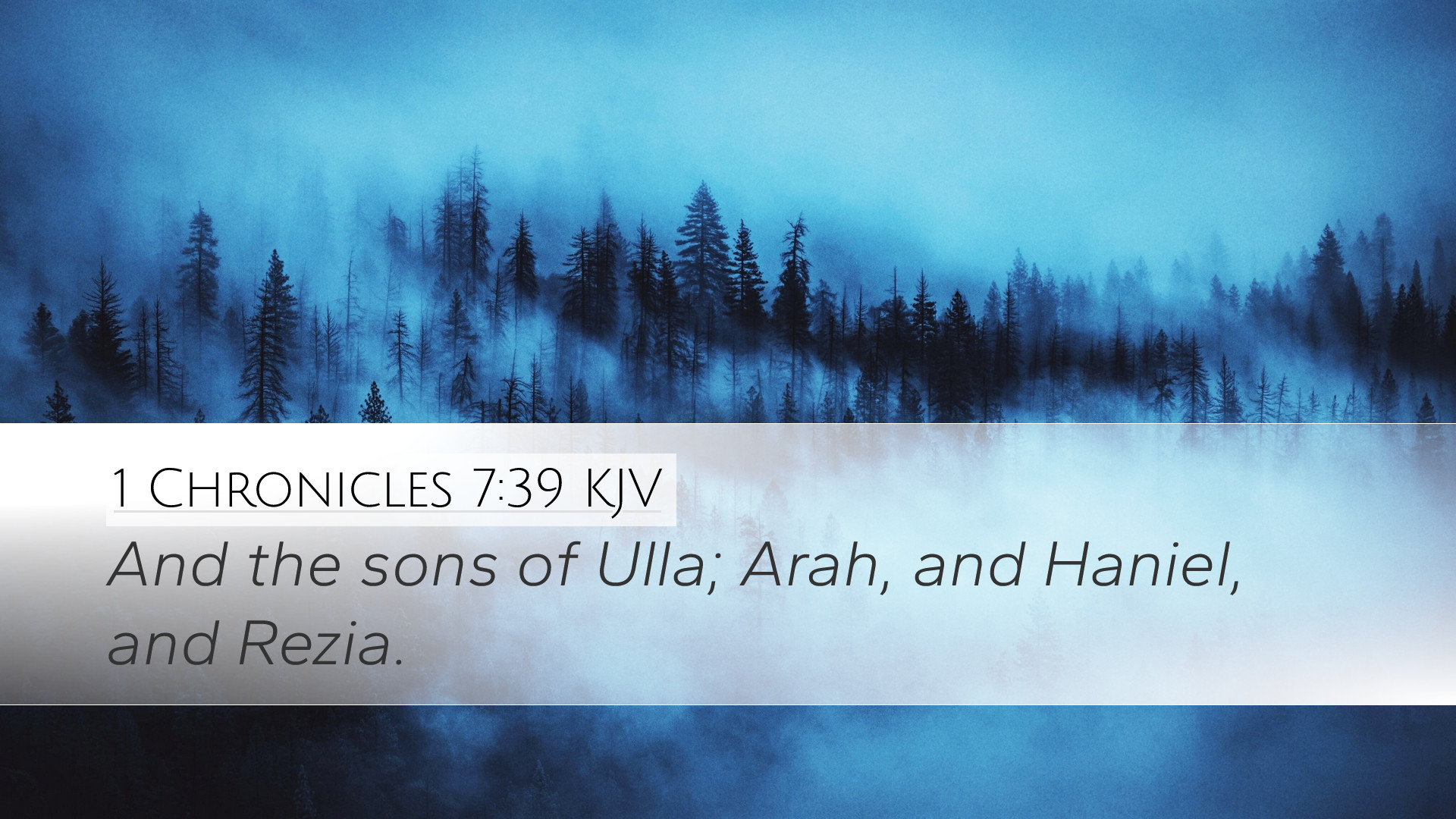Commentary on 1 Chronicles 7:39
1 Chronicles 7:39 states:
"And the sons of Jerahmeel the firstborn of Hezron were, Ram the firstborn, and Bunah, and Oren, and Ozem, and Ahijah."
Introduction
This verse falls within a genealogical record, typical of the books of Chronicles, tracing the lineage of the tribe of Judah through Hezron to Jerahmeel. Understanding this passage is essential for developing an appreciation of the historical and spiritual significance of genealogies in the Bible.
Contextual Analysis
The genealogies recorded in Chronicles serve multiple functions:
- Historical Documentation: They provide a record of the lineage and the fulfillment of God's promises to Israel.
- Covenantal Significance: They demonstrate God’s faithfulness to His covenant with the patriarchs.
- Identity and Belonging: Genealogies reinforce the identity of the Israelites as God’s chosen people, maintaining tribal and familial connections.
Commentary Insights
Matthew Henry's Perspective
Matthew Henry emphasizes the importance of recognizing that genealogies are not mere lists of names; they reflect God’s providential care and the unfolding of His plan through history. Henry notes that Jerahmeel, being the firstborn of Hezron, symbolizes both the privilege associated with the birthright and the responsibilities that accompany it. Furthermore, the mention of his sons illustrates the way God continues to work through generations, weaving His purpose through familial lines.
Albert Barnes Interpretation
Albert Barnes provides detailed insights into the names mentioned in this verse. Each name serves to honor the memory of individuals and to highlight the continuity of family in God’s redemptive history. Barnes notes that Ram, identified as the firstborn, may be significant in relation to the Davidic line which eventually leads to Christ. The inclusion of multiple sons signifies the expansion of Jerahmeel's lineage, which points to the blessings of God in fulfilling His promises to multiply His people.
Adam Clarke's Analysis
Adam Clarke delves into the cultural implications of the names and their connotations. He comments on how the name “Jerahmeel” itself indicates "May God have compassion," a reflection of the character of God towards His people. Clarke highlights the importance of remembering such genealogical records as they reinforce the faithfulness of God in history. He suggests that these accounts are crucial for understanding the emergence of Israel’s identity and destiny as God’s chosen nation.
Spiritual Significance
1 Chronicles 7:39 encapsulates a critical aspect of biblical theology—God’s faithfulness across generations. The genealogical listing is not merely about lineage; it serves a theological purpose:
- God's Faithfulness: Each name carries a story of God’s faithfulness to His covenant people.
- The Importance of Legacy: The verse underscores the importance of passing down faith and heritage to subsequent generations.
- Continuity and Purpose: The mention of subsequent generations demonstrates the ongoing plan of God in history, encouraging believers to see their place within this divine narrative.
Application for Today
For pastors, theologians, and students, this verse serves as a reminder of the importance of connecting the past with the present. The genealogies encourage a deeper understanding of our spiritual heritage and the importance of legacy in our personal lives and communities.
Additionally, this passage challenges us to reflect on how we honor the stories of faith in our families and congregations. It prompts leaders to consider the impact of their spiritual lineage on future generations and the necessity of nurturing a vibrant faith community.
Conclusion
In summary, 1 Chronicles 7:39 is rich in historical and theological significance. Through the eyes of Matthew Henry, Albert Barnes, and Adam Clarke, we understand that each name represents a thread in the tapestry of God’s salvation history. It invites us to appreciate the past while actively participating in the unfolding story of God's redemptive work in the present.


